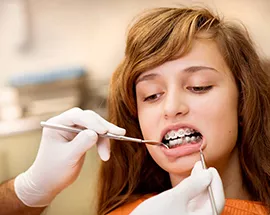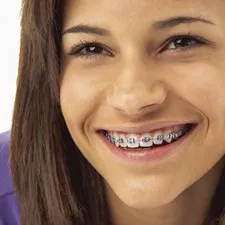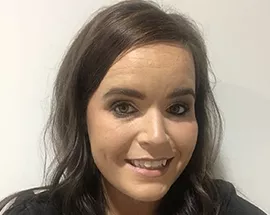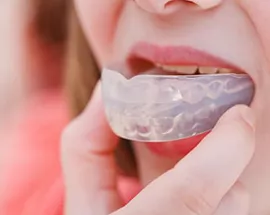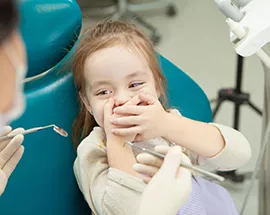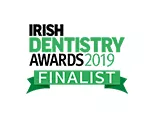
CAN YOU IMAGINE an Ancient Egyptian in braces? Are you picturing an appliance made out of metal bands and catgut? That’s right; the practice of straightening misaligned teeth has been around since ancient times! So how did we get from there to the braces of today? Evidence suggests that those braces made of catgut and metal bands were likely only used as part of a burial ritual, to make sure the dead person’s teeth looked nice for the afterlife. Similar burial rituals were performed in Ancient Greece and by the Etruscans. The first time braces were used to straighten the teeth of the living was in Ancient Rome, around 400 BC. 400 years later, Aulus Cornelius Celcus theorized that teeth could be guided into place by applying hand pressure in the right direction as they grow in, but modern orthodontic research doesn’t support this. Braces And The Industrial Revolution Not much changed in orthodontics until the 18th century, when Pierre Fauchard created the first known modern braces. His invention, the bandeau, was a horseshoe-shaped piece of metal with holes throughout it, held in place by silk threads. He also tried tying teeth together in an effort to get them to stay put while they healed. Christophe-François Delabarre tried separating crowded teeth by putting wooden wedges between each tooth. Yikes! The Emergence Of Modern Day Braces In 1822, J.S. Gunnell invented occipital anchorage (the first form of headgear), but the man considered to be the father of modern orthodontics was Edward Hartley Angle. Angle formally identified different types of malocclusions (bad bites) and developed appliances to correct them beginning in 1880. Through all these developments, early orthodontists were still limited by technology. They didn’t have bonding agents that could allow front-mounted brackets like in today’s braces, so moving teeth required wrapping metal completely around each tooth. That all changed when dental adhesive hit the scene, and the development of stainless steel in the ’70s also made braces more affordable because they no longer had to be made out of silver or gold. Finally, invisible aligners hit the scene in the late ’90s. A Variety Of Options There’s no better time in history to get orthodontic treatment than now, thanks to all the incredible advancements over the centuries and particularly the last few decades. And while today’s orthodontic treatment is always tailored to individual patients’ needs and everything is far more streamlined and low-profile than it was in the past, there are a few basic options most people can choose from.
What We Have To Offer If you’re in need of orthodontic treatment, you can be sure you’ll only receive the most efficient, comfortable, and up-to-date appliance at our practice. So don’t be shy; come see us today for a consultation! Thank you for choosing us as your preferred practice! |
Category: Uncategorized
Tasty Alternatives To Banned Foods
|
|
|
|
|
Baby Teeth Myths—Busted!
|
YOU MIGHT THINK that baby teeth don’t matter because “they’re just going to fall out anyway,” but think again! There are a lot of myths about baby teeth out there, so we’re going to set the record straight: here’s a list of the top four baby teeth myths, BUSTED! Myth #1: Baby Teeth Aren’t Important Although baby teeth eventually fall out, they are extremely important to a child’s developing oral health. Not only do they hold the space for permanent teeth to grow in straight (preventing crowding and crooked teeth), they also help the face structure develop properly and ensure that young children can eat and receive plenty of nutrition. Myth #2: Cavities In Baby Teeth Don’t Matter You might have heard that babies can’t get cavities at all, or that if they do have them, it’s not a big deal. Both rumors are untrue; not only are cavities painful, they can cause swelling and even infection. In addition, children who have cavities in their baby teeth are three times more likely to develop cavities in their adult teeth. If you think your child may be developing a cavity, marked by discoloration or a small crack, call us right away! TIP: Don’t let your child fall asleep with a bottle! Juice and milk are full of bacteria-feeding sugars which cause cavities. Myth #3: You Don’t Need To Brush or Floss Baby Teeth You should begin “brushing” your children’s teeth even before their first tooth grows in! Just use a soft, wet cloth or bit of gauze to rub their gums to help reduce bacteria and prevent future cavities. Once teeth come in, help get your children in the habit of brushing twice daily with a smear of toothpaste and flossing regularly. Myth #4: Young Children Don’t Need To See A Dentist There is a common misconception that children shouldn’t visit the dentist before the age of three, or before they have their full set of 20 primary teeth. The ADA states that children should visit the dentist by the time they get their first tooth, or at least by the age of one.Early check-ups can identify cavities and help prevent and assess other problems. Need Any More Myths Debunked? We Can Help! If you have any questions regarding your child’s oral health, give us a call! We love any opportunity to help you, our wonderful patients! Thank you for being a part of our practice family. |
Dental Care when Pregnant!
IF YOU’RE PREGNANT, you’re probably worried about anything and everything that may affect your baby, especially if you’re a first-time mother. But when it comes to your dental care, there’s no need to worry!
Annual exams and preventive dental care during pregnancy are not only safe, but recommended. In fact, you need to pay special attention to your dental health while pregnant, as your teeth and gums can be affected by the hormonal changes that take place during pregnancy.
Watch Out For These Things During Pregnancy
Morning sickness and increased levels of progesterone can result in some dental problems for pregnant women. Here’s what you should be on the lookout for:
- Pregnancy gingivitis—an inflammation of the gums—occurs because of changing hormone levels. Some women may experience bleeding when brushing or flossing and red, swollen gums.
- Periodontal disease, or gum disease, is caused by bacterial infection that develops below the gum line. This disease damages the fibers that hold your teeth in place and can also affect the health of your baby. Studies have shown that expectant mothers with periodontal disease are at a higher risk of premature delivery and lower birth weights.
- Dry mouth comes from a decrease in saliva caused by hormonal changes. Chewing sugarless gum can help increase saliva production.
- Erosion of tooth enamel is always a risk associated with vomiting. As morning sickness and frequent vomiting are common during pregnancy, enamel erosion on the back of the front teeth is more likely to occur.
How To Care For Your Teeth When Expecting
So, how do you avoid the dental problems that can arise during pregnancy? Easy: be consistent in your normal oral care routine!
- Eat healthy. Nutrition is important for your teeth, as well as the teeth of your developing baby. A nutrient-rich diet is the best thing you can do for your oral and overall health.
- Brush regularly. As usual, brush at least two times a day for two minutes, and if possible, brush with toothpaste that contains fluoride.
- Floss. Need we remind you? Flossing at least once a day helps prevent pregnancy gingivitis.
- Use mouthwash. Antimicrobial mouthwash fights the bacteria that contribute to gingivitis and periodontal disease.
- Tell your dentist you’re pregnant. If X-rays, medication, or anesthetics are being considered, your dentist can weigh the risks and do what’s best for you and your baby.
- Visit your dentist. Preventive dental care while pregnant is essential to avoid oral infections. When you find out you’re pregnant, make an appointment and speak to your dentist about how you can avoid pregnancy-related dental problems.
Expectant Mothers Can Trust Our Practice
Visits to your dentist during your pregnancy are just as important as visits to your healthcare provider. We care about the dental and overall health of you and your child. So, between trips to the doctor and Babies-R-Us, don’t let visiting the dentist fall off of your pregnancy to-do list!
Thank you for being our valued patient and friend!
Are you missing a tooth or teeth?
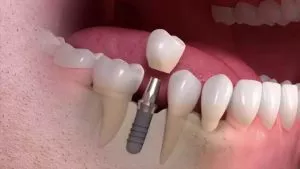
Are you missing a tooth or teeth?
It sounds the stuff of nightmares, but more and more patients are outlasting their teeth. Increasingly patients are needing extractions of teeth not due to neglect (although this does still happen) but simply because fillings, crowns or root filled teeth are wearing out under the demands of our busy lifestyles and leaving us with the question none of us want to be presented with – how do I replace a tooth that can’t be fixed?
The solution is in the form of dental implants. Dental implants are a precision restoration that replaces the roots of a missing tooth or teeth in order to act as a stable secure support for various types of restorations, dependant on the wants and needs of our patients. These restorations include single crowns, small bridges replacing 2 teeth, larger bridges replacing more than 2 teeth and potentially replacing a full set of teeth. Implants can even be used to secure dentures that are otherwise unwearable due to lack of remaining gum height.
What is involved in placing a dental implant?
Each patient we see is different and, as such, there is no one-size-fits-all plan. We treat each patient as an individual and assess each case with the care attention we would expect if receiving treatment ourselves. The first step is a free initial consultation for our implantologist to discuss with you your wants and needs and to check it is feasible to place an implant before you are charged for any further planning. If you decide you wish to proceed with planning we arrange a succession of appointments in order to meticulously plan the proposed treatment, allowing you to be able to see how you will look at the end of your treatment and for us to assess every aspect of the plan, from where best to place the implants to when we will be able to fit your final restoration to make sure you aren’t wearing your denture on holiday or in your wedding photographs.
At Dental Excellence we firmly follow the philosophy of restoration driven planning, where we place our implants so as best to support and retain your restorations rather than placing the implant where there is bone available and figure out where the teeth would go later. This may seem a strange statement to make but we are seeing increasing numbers of patients who have had implants placed but are less than happy with the finished outcome purely because the implant is simply in the wrong place to support the restoration. We achieve our philosophy by using state of the art CT scanning, placing our implants using computer generated guides and working with the best technicians available to ensure the best possible results for our patients.
Why does the price of dental implants vary so much?
Simply put – you get what you pay for, as with most things in life. Believe it or not, it is possible to purchase implants from ebay for around €25 and it is possible for a dentist to train to place implants in a weekend. There is extensive research in dental circles as to how long dental implants last so we can properly advise you, our patients. The figures show us that dental implants are incredibly successful – rates of 95-98% are the current accepted figure. However, these success rates can vary. Causes of this variation are associated mainly with the general health and lifestyle of the patient and the available bone in which to place the implants in. There is also a factor relating to how the surgery is performed and what type of implant is used. As you would expect, cheaper implants and less experienced surgeons have a higher failure rate. At Dental Excellence we exclusively use Straumann implants – a premium implant brand renowned for their extensive research into perfecting the design and manufacture of their implants. Our implant team is led by Dr David Gwyer. David has been involved in implant surgery since graduating from university in 2009 and is currently reading for a Masters degree in implantology through the university of Bristol. David has helped countless patients to restore their smiles and regularly attends training courses in addition to his university studies to ensure he is at the cutting edge of dental implantology.
Can I have dental implants?
There are very few patients to which we say, “We cannot provide implants for you”. Recent advances in implant technology mean that more and more patients are now able to have implants to restore their smile. Age is no barrier – as long as we can see your mouth is in a stable healthy condition or that it is possible to correct or treat any dental issues there is a strong likelihood, we will be able to help you.
I’m afraid it will hurt
Aren’t we all? You will be glad to know that placing a dental implant is often no more uncomfortable or invasive than having everyday dental restorative work or a simple extraction. Naturally we will provide you with appropriate medication should you need it, but our experience is that most patients don’t take any pain relief at all. If you are in any way anxious about any part of your treatment don’t let this be a barrier to you. We have the facility to offer sedation or ‘twilight sleep’ for any and all procedures that we provide at Dental Excellence. With the addition of sedation you can have your treatment carried out in a relaxed, calm way – most patients simply drift off to sleep and wake up when the treatment is complete.
Sounds good. I’m worried about whether I can afford the treatment.
No matter how appealing we make dental implants sound the simple fact is that it is a more expensive treatment option than others available. We can advise with absolute confidence that you will feel you have received complete value for money. Dental implants far out perform other treatment options for missing teeth, both in longevity and improvements to quality of life. To give you an idea of what we mean below you will find the normal costs and likely lifespan of the main treatment options for restoring a space left by a single missing tooth.
Implant over-denture blog By: Dr David Gwyer
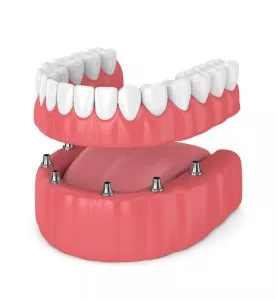
Implant over-denture blog
In my 10 years as a qualified dentist not many days pass without a patient coming to see me trying to find a solution for a loose denture. These patients have often seen several dentists, who have provided them with several different dentures to try and improve on the fit of the previous denture. Unfortunately, the problem is usually more than remaking a denture that is not correctly made. Often, there is not a problem with the denture – the issue lies with the tissues supporting the denture.
When a tooth is extracted the gum and bone that once supported the tooth simply become redundant and shrink away. Previously the only option to restore a space quickly would be to fit a denture. Therein lies the problem – dentures are not teeth. As any denture wearer will tell you a denture sits on top of the gum and usually fits well to start with. Over time, however, the gum shrinks away from the denture as it puts an unstable force on the gum. This continues until the annoying loose denture prompts the patient to visit their dentist, usually with the result of a new denture being made to fill in the missing space and the cycle repeats. If left long enough the gum and bone can potentially shrink back to the point where there simply is no tissue left to support the denture and the unfortunate patient is resigned to using fixatives or denture glue to get any support in order to eat or smile.
Recent studies show that over 50% of denture wearers have some degree of difficulty in keeping their dentures from moving around. The impact of loose dentures can be wide-reaching and, in some cases, debilitating. At the very least the denture wearer will be troubled by areas of discomfort caused by the dentures traumatizing areas of soft tissue that aren’t used to bearing the weight of day to day biting forces. However, social embarrassment often tends to be the main driving force behind patients seeking solutions to improve the fit of their dentures with reports of avoidance of certain types of food or giving a natural smile for fear of dentures being displaced to an uncomfortable position or falling out completely.
The solution to all these problems is implant retained dentures. By placing as few as 2 implants in the lower jaw and 4 in the upper you can confidently say good bye to loose dentures and their associated problems. By placing dental implants the surrounding bone is preserved so your dentures will fit better for longer. You can laugh and smile without fear of your denture falling out and enjoy foods that you previously avoided. Steak dinners are a reality once more!
In real terms placing dental implants to retain a denture might actually save you money. According to research the average life expectancy of an implant retained denture is 17 years compared to 3-5 in a conventional denture. Whilst no monetary value can be placed on quality of life and comfort you can expect to receive this and value for money in an implant retained denture. There is not the need for regular relines and replacements, both of which can be costly and require you to be without your denture for several days at a time. The usual maintenance costs, aside from your regular check up, are simply the periodic replacement of retention inserts. These are approximately €50 each every 5 or so years.
Contact our friendly reception team on 0906475387 for a complimentary consultation to see how implant retained dentures can change your life for the better.
Ciara’s Invisalign Journey
Its Invisalign Day 21st Sept 2018
So today is the day I start my invisalign journey !!! I’d been away on holidays so there was a bit of a delay in starting the invisalign treatment as it would normally take approx. 2 weeks for your trays to arrive… so today’s appointment was 45mins with NO PAIN at all. I’ll attach a few photos to show you what went on. Firstly, the brackets were placed, like I said before this is just like a filling without the injection or drilling, The next step was to make space between my teeth (every case is different so you may not need this done). Dr. Saif applied some numbing gel onto my gums as he said I may have some sensitivity while he was filing down the teeth, but there was no pain at all. The whole treatment was very quick and completely painless. After he had made the spaces it was then time to fit my first tray… eeeekkk. It just clips in over the brackets. It does feel a little tight but that’s the idea, it’s to move your teeth!!
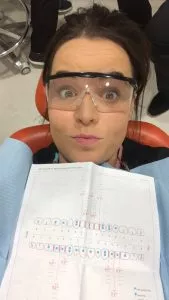
The look of fear.. .the page includes all the details for Dr Saif, on what teeth the brackets will be placed on and also what teeth need adjusting.
Prepping the teeth for the brackets and placing the brackets
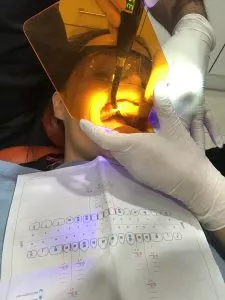
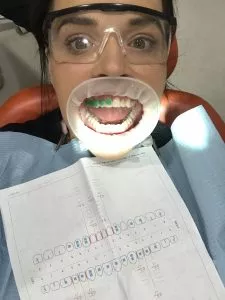
There ON!!!!!!!!!!!
Update:
2hours on….
Ok back working on reception, we have a few issues…. Answering the phone saying ‘dental excellence’ is one!!!! Please go easy on me and don’t make me say difficult words like sizzling sausages!!! Haha. I’m sure ill get use to it soon (I hope).
Other than that, everything else is going good. I had lunch which meant taking the trays out and placing them in a box that was provided with them. The brackets feel a bit funny, like I have food on my teeth. I think I’ll be carrying a mini mirror and toothbrush with me everywhere I go now. The trays were a little difficult to get out but again I think that’s just a matter of me getting use to taking them in and out!
7 hours on….
There is a lot of pressure on my teeth especially the top ones. I am finding them quite sore. Dinner was difficult, Chewing was painful. (this could be the best diet plan for the wedding haha). I’ve taken some pain killers which were advised by Dr Saif to help. It’s to be expected after all the are moving my teeth no pain no gain as they say!
9 hours on…

Pain is still there lots of pressure on top teeth. I’m so tempted to take them out, but I know if I do I won’t put them back in. I’ve got myself an ice pack and have it placed on my mouth which is helping a lot. Let’s hope I get some sleep.
24hours on:
Little or no pain now. Had a brilliant night’s sleep didn’t need to take any more pain killers the ice-pack really helped. Biting down is still a little sensitive but manageable. Really need to start practicing talking though. Who knew it would be so difficult to say Sixty or Fifteen!!!
Ill keep you all posted in the coming days on how the speech and eating is coming along. Ciara x
Ciara’s invisalign (clear brace) Journey…

Hi Everyone, So I’ve decided to take the plunge and get straight teeth by using clear braces and I want you all to follow my clear brace journey from start to finish!
…. I’m 31 and my teeth never really bothered me while I was younger, but in the last few years I have noticed that they are no longer as straight as they were or else I’m just more conscious of my smile now! Working in the dental field I feel you’re a walking advertisement for teeth, every single person who walks through our doors is looking at our teeth and this has definitely made me more conscious of them. While working here I’ve seen so many people walking out with new smiles and I’ve finally decided I want one too ? Well that and I’m getting married in April!!!!! The one day in your life that all eyes are on you… So, if my dress doesn’t wow I hope my teeth do haha! Im going to be documenting my full Invisalign treatment from start to finish so I hope you enjoy x
Deciding on Invisalign ®:
Deciding to go with Invisalign was a very easy decision for me. I wanted something more discreet that nobody would really notice. We live in a world now where we have wireless headphones, mobile phone etc and now we have braces that don’t need any wires. You don’t need to suffer through years of uncomfortable and unsightly metal braces to achieve straight teeth. Invisalign offers lots of benefits over traditional braces. You can achieve the same results of straight and aligned teeth without the pain and difficulty caused by metal braces. When you use Invisalign, you can still eat the foods that you enjoy, remove your aligners to brush and floss, smile with confidence, and enjoy total comfort during the entire process. Which is the complete opposite with metal braces which can be a little more uncomfortable and leave users feeling self-conscious, and can’t be removed until the end of the treatment process.
What Is Invisalign?
Invisalign is a set of clear, removable, virtually invisible dental aligners that fit over your teeth to discreetly correct your smile over time. Unlike metal braces that are glued to the surface of the teeth, Invisalign aligners are customized to fit snugly over your teeth and slowly move them into the proper position.
My first visit to Dr Saif Friday the 17th August 2018
My first visit was a consultation. Dr Saif discussed with me what my main goals were and what changes I wanted to make to my teeth. He then done a thorough examination to determine a diagnosis and specific treatment plan that is unique to me. After this an OPG (large x-ray of my mouth) was taken and some photos, which are attached below. Unfortunately, the day I had my consultation we didn’t have a 3D scanner in the practice, so the next step was to take impressions of my teeth to send to the lab, I was dreading this part as I thought I would gag but it was actually very easy its just like putty in your mouth. The 3D scanner does the same thing as the impressions by using what looks like a mini wand camera.
Second Visit: Clincheck 24th August 2018
This was a very exciting day I got to see exactly what my teeth were going to look like at the end of the treatment. We also discussed the treatment in more detail such as the attachments that will need to be placed on my teeth to help with the movement. These will be done with a filling material which will be the same colour as my own teeth so they won’t be very noticeable. We also discussed the length of time the treatment will take, as I’m getting married in 7 months I was very anxious that the treatment will be finished before then. So, my treatment is going to be 19 trays which I will change every 7 days leaving the total treatment time 19weeks, there may be weeks where I need to wear a tray for a little longer if movement hasn’t been enough but in general it will be every week. I’m so excited to get started!
I look forward to sharing with you my next visit…. love Ciara xx
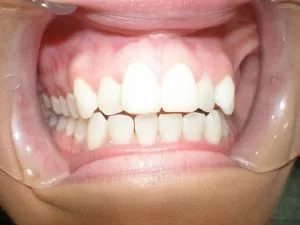
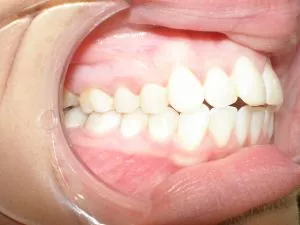
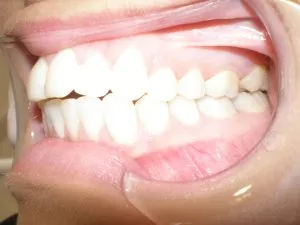
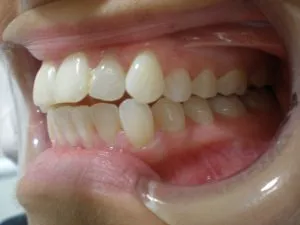
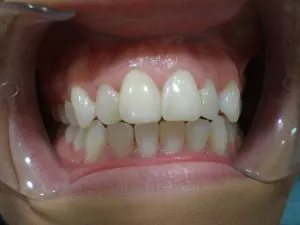
CUSTOM MADE MOUTH GUARDS
THE FAMILIAR SMELL OF FRESHLY CUT GRASS on the soccer field, the gleam of the basketball court before a game, the cheering fans at the Rugby stadium, the feeling of the Camogie bat, familiar in your hands, the crisp strike of the Hurling stick… There’s no doubt about it–playing sports can be a magical thing.
We love when our patients are having fun and being active, but unfortunately, sports-related dental injuries happen all the time. That’s why we make custom mouthguards in our practice, so you and your children can always play your sport safely!
Wear A Mouthguard And Reduce Your Risk Of Injury
You may be surprised to learn that up to 40 percent of dental injuries are sustained during sports activities. RUGBY AND GAELIC FOOTBALL ARE PERCEIVED TO HAVE THE HIGHEST RISK OF INJURY. In fact, not wearing a mouthguard makes you 60 times more likely to sustain an injury to the face and mouth! Wearing a mouthguard during recreational as well as competitive sports activities decreases both the frequency and severity of injury.
A fractured, chipped or knocked-out tooth isn’t the only thing a mouthguard safeguards against. Did you know that wearing a mouthguard can also help prevent more serious injuries such as concussions, jaw fractures, and neck injuries? Not to mention the protection it provides for the soft tissues of the mouth like the tongue, lips and cheeks.
This is especially true for those of you with braces. Not only are your braces an investment you should protect, but those metal brackets can be especially damaging to your mouth if you’re hit by a stray ball or elbow. On top of that, if your braces are damaged, there may be a delay in your orthodontic treatment.
Custom Mouthguards from the Dentist Provide More Comfort And Protection
When it comes to purchasing a mouthguard, you have a couple different options. A custom-fit mouthguard made specifically for you by a dental professional is the most effective and comfortable choice. We can even specially customize your mouthguard for the specific sport you play by choosing your team colours. Custom mouthguards are:
Less likely to be displaced during the action because of their custom fit.
Durable and tear-resistant. Custom mouthguards last longer due to the higher quality of materials used to construct them.
More fitted and less bulky. This adds to the overall comfort and makes talking, breathing and swallowing easier.
Your Smile Is Worth Protecting
Parents need to be aware of the importance of wearing a mouthguard for contact sports.
Customized specifically for your smile, the mouthguards we make in our practice provide superior safety and genuine comfort.
Your smile is worth protecting.
Talk to us today about your own custom mouthguard!
Please call our team for a price list depending on your club team colours…

The content on this blog is not intended to be a substitute for professional medical advice, diagnosis, or treatment. Always seek the advice of qualified health providers with questions you may have regarding medical conditions.
ANXIETY AT THE DENTIST
 Anxiety at the Dentist
Anxiety at the Dentist
Is anxiety and fear of the dentist putting you off getting necessary dental work done? Well we may just have the solution with our very patient caring dentist – Dr David Gwyer BDS hons. David undertook his dental training in Cardiff University dental hospital in Wales. He is interested in all aspects of general and cosmetic dentistry with a special interest with patients who suffer with Dental Phobia.

We have asked Dr. David to give us some information for our patients and here is what he has to say… “Here at Dental Excellence, I am seeing an overwhelming number of patients who have been so nervous of going to the dentist that it is putting them off getting their treatment done, there is a solution that lies in the form of sedation”
What is the benefit of sedation we asked? “Sedation allows you to face your fear of the dentist and have your dental work carried out without any worry, and you will be totally relaxed and have little to no memory of the treatment” David also goes on to say “I try to cover as much dental work as possible in each visit. Many cases only take one visit, the patient is sedated and all their fillings are completed for them at this time; they wake up with all the work finished”. “Patients who suffer with a gag reflex often tollerate treatment under sedation.
What types of sedation are available? “At the time of your assessment we will go through a questionnaire to find out what sedation is best for you and tailor a plan especially to your needs. The most popular options we find are: Oral Sedation; in the form of a small tablet, this just takes the edge off your anxiety and can make you feel more at ease and relaxed. There is another form of sedation called Intravenous Sedation. This involves an injection of the sedation into your arm. It is the strongest form of sedation that is given in dentistry and leaves you feeling almost asleep, it also causes amnesia which means that you forget having your dental work done!”
Can anyone have sedation? “There are some medical conditions that mean that we are not able to sedate you. A full medical history and checks are carried out at the time of assessment and this is free of charge”.
Are there any risks involved? ” Sedation is safe and we always make sure we take a thorough medical history before we start. You will be monitored by our highly trained team throughout the procedure to ensure that you are fit and well throughout and following the procedure.We fully discuss the benefits of sedation and any risks involved at the consultation appointment”
Can I go straight home afterwards? “After treatment is complete you will be able to go home fairly shortly after but you may feel a little drowsy for a few hours. We recommend not to return to work and you will require an escort to take you home as you will be unable to drive or supervise young children until the effects have fully worn off ”
Thank you Dr. David!
Here at Dental Excellence we endeavour to create the ‘Spa’ experience rather than the dreaded old fashioned trip to the dentist. No one could imagine that a trip to the dentist can be a life-changing event.
We aim to make your visit to our clinic as comfortable and relaxing as possible. As well as complete discretion, we offer a personal service with a caring team of support staff who will offer you headphones, a choice of DVD and chair-side monitors so you can enjoy your choice of entertainment.
Lip balms, neck pillows and hot towels contribute towards making you feel at ease throughout your treatment. We have built a fabulous reputation for our customer care and endeavour to make your experience as unique and pleasurable as possible.
We offer a free consultation service and cost effective treatments and payment plans to suit every budget. Call today or visit our website to book a free consultation with one of our amazing team of Dentists.
5/6 Elworth Court, Golden Island, Athlone, Co Westmeath, N37KP95
E: [email protected] T: 09064 75387
Find us on Facebook www.dentalexcellence.ie

